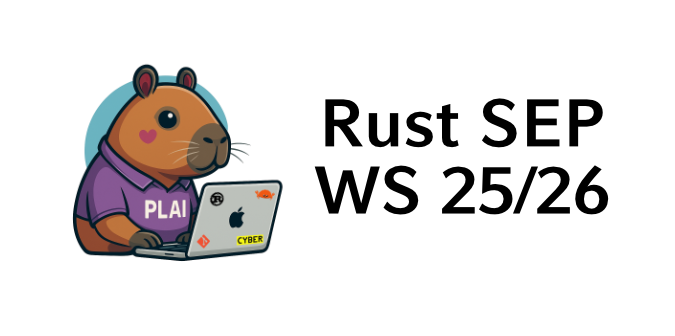- Teacher: Armin Hadziahmetovic
- Teacher: Samuel Klein
- Teacher: Ralf Zimmer
In diesem Praktikum entwerfen, spezifizieren und implementieren die Studierenden unter Anleitung ein größeres Softwareprojekt. Dabei werden die in den Vorlesungen “Einführung in die Programmierung” und “Programmierung und Modellierung” erlernten grundlegenden Konzepte und Techniken praktisch eingesetzt und erweitert. Des weiteren werden Kenntnisse über Softwareentwicklungs-Tools wie Versionsverwaltungsprogramme (Git) oder Integrated Development Environments (IDE) vermittelt. In der ersten Phase des Praktikums (Vorprojekt) werden nochmals grundlegende Fähigkeiten in der Programmentwicklung in Einzelarbeit geübt. Nach Bestehen der ersten Phase, werden die Studierenden in Teams von 5-6 Personen aufgeteilt. In der Hauptphase des Praktikums wird dann eine größere Python-Applikation im Team entwickelt. Hierbei können die Studierenden dann auch wertvolle Erfahrungen über Team- und Projektarbeit sammeln.
Thema der Projektarbeit:
Die Projektarbeit behandelt das Thema der Unsicherheit im Maschinellen
Lernen. Konkret geht es darum eine Softwareapplikation in Python zu
implementieren, damit Modelle Unsicherheit repräsentieren und
quantifizieren können.
Bitte Beachten:
12 ECTS entsprechen einem Arbeitsaufwand von ca. 24 Stunden pro Woche.
Es ist in keiner Weise ausreichend, nur den Plenumstermin und die
Tutortreffen wahrzunehmen, sondern sie müssen sehr viel eigenständig am
Computer arbeiten und programmieren. Sie müssen genug Zeit für dieses
Praktikum einplanen um problemlos einen Termin mit ihren
Gruppenmitgliedern zu finden.
- Teacher: Clemens Damke
- Teacher: Eyke Hüllermeier
- Teacher: Maximilian Muschalik
- Teacher: Santo Thies
Self-Enrollment Key: #![forbid(unsafe_code)]

- Teacher: Tim Lange
Beschreibung:
In diesem Praktikum entwerfen, spezifizieren und implementieren die Studierenden unter Anleitung ein größeres Softwareprojekt.
Dabei
werden die in den Vorlesungen “Einführung in die Programmierung” und
“Programmierung und Modellierung” erlernten grundlegenden Konzepte und
Techniken praktisch eingesetzt und erweitert. Des Weiteren werden
Kenntnisse über Softwareentwicklungs-Tools wieA
Versionsverwaltungsprogramme (Git) oder Integrated Development
Environments (IDE) vermittelt.
In der ersten Phase des Praktikums
(Vorprojekt) werden nochmals grundlegende Fähigkeiten in der
Programmentwicklung in Einzelarbeit geübt.
Nach Bestehen der ersten
Phase, werden die Studierenden in Teams von 5-6 Personen aufgeteilt. In
der Hauptphase des Praktikums wird dann eine größere Java-Applikation im
Team entwickelt. Hierbei können die Studierenden dann auch wertvolle
Erfahrungen über Team- und Projektarbeit sammeln.
Bitte beachten:
12 ECTS entsprechen einem Arbeitsaufwand von ca. 24 Stunden pro Woche. Es ist in keiner Weise ausreichend, nur den Plenumstermin und die Tutortreffen wahrzunehmen, sondern sie müssen sehr viel eigenständig am Computer arbeiten und programmieren. Sie müssen genug Zeit für dieses Praktikum einplanen um problemlos einen Termin mit ihren Gruppenmitgliedern zu finden.
Termine und Ort:
| Veranstaltung | Zeit | Ort |
Beginn | |
|---|---|---|---|---|
| Plenum |
|
tba |
tba |
- Teacher: Umut Kanilmaz
- Teacher: Simon Rauch
- Teacher: Matthias Schubert
- Teacher: Daniel Diefenthaler
- Teacher: Fabian Dreer
- Teacher: Karl Fürlinger
16.10.2025 - 05.02.206
Do, 10 -12 Uhr c.t.,
Room: HG, Geschw.-Scholl-Pl. 1 (A), A 015
11 SWS
Machine learning is changing the world. It can be found in almost all
segments including healthcare services, education, transport, food,
entertainment and many more. Specifically, in the field of computer
vision, machine learning techniques have enabled programs to interpret
and understand the world, sometimes even better than humans.
In this course, we will work on several projects to solve several
computer vision tasks using python. The students will have a chance to
get their hands on the classical (or potentially deep) machine learning
algorithms in teams, and apply those techniques to some of the most
interesting topics in computer vision.
- Teacher: Ursula Fantauzzo
- Teacher: Ming Gui
- Teacher: Björn Ommer
- Teacher: Johannes Schusterbauer
- Teacher: Caroline Friedel
- Teacher: Volker Heun
- Teacher: Evi Sinn
- Teacher: Ralf Zimmer
Das Blockpraktikum bildet eine theoretische und praktische Einführung in die Administration und Konzeption virtueller Systeme. Unter Laborumgebung wird die Installation, Konfiguration und Administration von Virtuellen Systemen anhand Softwarelösungen von VMware durchgeführt.
Inhalte
Inhalt der Lehrveranstaltung sind Installation, Konfiguration und Management von VMware vSphere 8.0
- Course Introduction
- Introduction to vSphere and the Software-Defined Data Center
- Virtual Machines
- vCenter Server
- Configuring and Managing Virtual Networks
- Configuring and Managing Virtual Storage
- Virtual Machine Management
- Resource Management and Monitoring
- vSphere Clusters
- vSphere Lifecycle Management
Das Praktikum enhält Vorlesungsanteile und praktische Übungen.
Die Anmeldung findet über Moodle statt, da LSF vermutlich erst zum regulären Semesterstart verfügbar sein wird. Der Einschreibeschlüssel für den Kurs lautet: vSphere
- Teacher: Tobias Lindinger